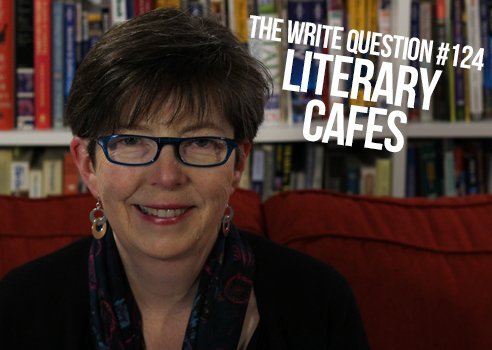Viewing time: 5 mins. 15 secs.
The Write Question is a weekly video podcast about writing that I started in 2017 and that ran, more or less weekly, until April 2022. This is a republication of issue #124, which discusses how to set up a literary cafe. The post first ran on Jan. 10/20.
Transcript:
Have you ever wanted to be involved with a literary cafe? That’s the topic I’m addressing today in The Write Question. I’m Daphne Gray-Grant, the Publication Coach.
I have a question from Khaled Akli, who’s currently based in Paris, France. Here’s what he’s asked via email:
“I am contacting you to seek advice for my colleague Kalkidan. We both work in IT in France, and we share the same passion for literature. Kalkidan is of Ethiopian origin and would like to relocate to Ethiopia in a few years to launch a literature cafe. Its main objective would be to promote literature in a cafe environment. Are you aware of such projects and what would you recommend from a literature standpoint to take into consideration?”
Thanks for your question, Khaled. While there are many literary cafes around the world — and I include a link to a list of them, below — I’m not aware of any in Vancouver, where I live.
But I am a serious reader and I enjoy my coffee, so I’m going to tell you what would entice ME into a literary cafe.
First, I think it’s important to decorate the room in a way that makes your theme obvious. This could relate to furniture, pictures on the walls and even, possibly, statues. These images should relate to the type of literature you want to promote.
So, for example, if you’re going to focus on Ethiopian writing you might include images of Haile Gerima, Nega Mezlekia or Sahle Sellassie. On the other hand, if you want to promote a more Eurocentric view, you could focus on writers such as George Orwell, T.S. Eliot and Virginia Woolf.
As part of the decorating theme, I’d suggest you have a bookshelf stacked with books by the authors you want to highlight. These don’t have to be new books (which would be a considerable expense); second-hand ones would be more than fine. In fact, you could encourage patrons to exchange books. Allow them to take one from your shelves if they’re willing to leave behind another book.
And, of course, you’ll want a bulletin board where people can put up posters for events or perhaps advertisements for things like tutoring or piano lessons. This is great for engaging with the community and perhaps turning your literary cafe into a bit of a neighbourhood hub.
It would be especially worthwhile to have an area of the cafe that could function as a “stage.” You’d want to establish a monthly — or perhaps even weekly — performance, where writers could do readings from their own work. This live performance aspect of the café would really help differentiate you from other spots in town.
By the way, you’ll also need to develop a policy about how long writers can “hang out” without having to buy more coffee. I’ve known people who will plant themselves in a cafe for more than four hours while they nurse a single cup. The economics of that are obviously bad for the cafe owner. To make the place economically sustainable, you obviously need to encourage turnover. Perhaps you can suggest that people are expected to buy a fresh coffee for every hour they are there? Just be sure to communicate this policy clearly.
Also, you’ll need to make some decisions about accommodating laptops. If you want to do that, you’ll need plenty of electrical outlets and Wi-Fi accessibility. These are both additional expenses that will lead to customers staying longer in their chairs, so consider whether you really want to encourage that.
For this reason, I’d suggest you ensure that your literary cafe is some distance from a university. This might seem paradoxical because university students sound like your core audience. But such students are famous for having almost-unlimited time and highly limited amounts of money. A neighbourhood cafe near to where I live went out of business for that very reason.
I don’t know anything about the success of cafes in North America but it seems potentially difficult to establish a business based on selling $3 or $4 cups of coffee for several hours of sitting. And I know even less about the success of such a venture in Ethiopia.
To me, the literary part of the model seems fairly straightforward. The big challenge will come from making any money at it.
Finally, let me wrap up with a quote from the late American writer Louisa May Alcott, author of Little Women: “I’d rather take coffee than compliments just now.”
Khaled, I think a literary cafe is a terrific idea. I just encourage your friend to make sure he has a business model that will allow him to succeed.
*
If you’d like to learn how to stop procrastinating and make writing a happier more fulfilling process for yourself please take a look at my latest book Your Happy First Draft. I don’t sell it in bookstores or via Amazon. The only place to buy it is on my website, link below.
Links
A visual tour of 35 literary bars and cafes from around the world


